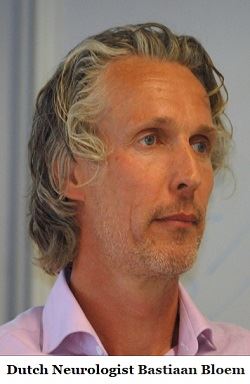 A Parkinson’s pandemic looms on the world’s horizon, says a leading Dutch neurologist. And like the infamous corona virus pandemic leaked from a laboratory, this one is mostly of our own making.
A Parkinson’s pandemic looms on the world’s horizon, says a leading Dutch neurologist. And like the infamous corona virus pandemic leaked from a laboratory, this one is mostly of our own making.A neurologist and professor at Radboud University Nijmegen Medical Center, Dr. Bastiaan Bloem, says that the number of people diagnosed with Parkinson’s disease will likely double in the next 20 years. Some 6.5 million million people are diagnosed with Parkinson’s today.
The main cause of this rapid increase has been people’s widespread exposure to herbicides, solvents, and other toxic chemicals used in agriculture and manufacturing.
World’s Fastest Growing Neurological Condition
“A pandemic, as everybody is now painfully aware, is a disease happening worldwide, to which no one is immune. PD fulfills all those criteria,” Bloem told Parkinson’s News Today by phone from the Netherlands.
“Parkinson’s is now the fastest-growing neurological condition on the planet.”
Dr. Bloem is co-author of a 2020 book titled, “Ending Parkinson’s Disease: A Prescription for Action,” along with neurologist Ray Dorsey from the University of Rochester, New York; Dr. Todd Sherer, chief executive officer of The Michael J. Fox Foundation; and Dr. Michael S. Okun from the University of Florida.
The 336-page work has become Amazon’s bestselling neurology book, with more than 429 reviews and a 4.5-star rating.
“Many neurological conditions such as Alzheimer’s disease are increasingly common because our population is getting older,” said Dr. Bloem. “But in a large survey published in The Lancet, after correcting for the aging effect, Alzheimer’s is stabilizing and stroke is actually diminishing thanks to better treatment.
The PD expert said that Parkinson’s is the only condition accelerating over and above the aging effect.
Herbicides linked to Parkinson’s
 Dr. Bloem points to the tight link between exposure to herbicides such as paraquat – a weed killer – and the risk of developing Parkinson’s.
Dr. Bloem points to the tight link between exposure to herbicides such as paraquat – a weed killer – and the risk of developing Parkinson’s.“These chemicals were introduced worldwide after World War II, and many are still used today on our fields,” said Dr. Bloem. “For this reason, farmers are at a markedly increased risk of developing Parkinson’s.”
Dr. Bloem said that mice fed paraquat stop producing dopamine in their brain cells.
“These chemicals are tremendously toxic to the brain, he said, “and have even been detected in milk, in supermarkets.”
Paraquat (which is banned in China but not in the U.S.) isn’t the only chemical posing this risk.
Trichloroethylene, a solvent used to clean metals and remove stains, has exactly the same effect on human brains. Yet, according to Dr. Bloem, it is still widely used and is detectable in high concentrations in groundwater.
“We’re doing this to ourselves”
“Parkinson’s is exploding in numbers. It’s a horribly debilitating disease, and it’s a costly disease that should matter to people and governments. We’re doing this to ourselves,” Bloem said. “But we can do something about it. We need to get rid of these toxic pesticides and move toward organic food. And we should take measures to protect people who work in these toxic environments.”
Dr. Bloem said that the 2020 book draws parallels to HIV and polio, which were once incurable, debilitating diseases.
“In the 1980s,’” said Dr. Boem, “people with AIDS chained themselves to the front doors of pharmaceutical companies demanding better treatments, and now people no longer die of AIDS.
He added that we need to raise awareness about the Parkinson’s pandemic which is happening right now.”
Celebrity Parkinson’s Victims Help Open Door to Awareness
Dr. Bloem, who has published more than 700 scientific papers and book chapters on the subject, said, “Parkinson’s is a recognizable disease affecting Muhammad Ali, Michael J. Fox, Alan Alda, Ozzy Osbourne, Linda Ronstadt and other famous people.”
His 11-minute TEDx talk, “From God to Guide,” has been widely praised by YouTube viewers.
ParkinsonNet
Dr. Bloem and his colleague, Marten Munneke, began ParkinsonNet, a respected Dutch health care concept that involves at least 12 disciplines, 70 regional networks, and 3,400 professionals who have all received PD-specific training. ParkinsonNet is credited with lowering costs associated with Parkinson’s care in their country and reducing hip fractures and hospital admissions.
These cost savings, he said, far outweigh the costs of building and maintaining the network.
One hidden, but potentially highly disconcerting, consequence of the pandemic is a marked reduction in physical activities, wrote Dr. Bloem.
“Many people are now largely unable to go out for a regular walk, let alone to see their physiotherapist or attend a fitness class,” he said. “A loss of aerobic exercise during the COVID-19 pandemic may well lead to a worsening of motor symptoms in PD.
“Non-motor issues such as insomnia or constipation may also worsen due to a lack of physical activity. Promoting home-based and adequately dosed exercises, such as cycling on a stationary bicycle, is therefore more important than ever before.”
RELATED
- Parkinson’s Lawsuit – Paraquat Pesticide
- Paraquat Lawsuits Pending
- Paraquat Pesticide Trial Updates – Dec. 2021

by Matthews & Associates




